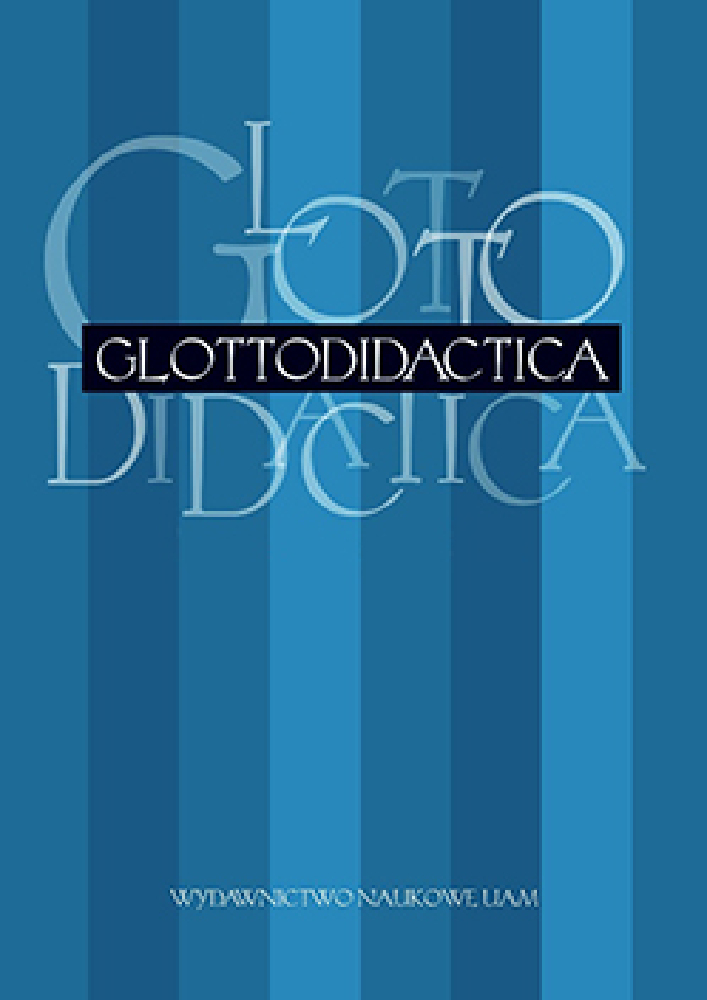Abstract
The discussion addresses the linguistic code and its contribution to the development of the codematic theory of foreign-language teaching. This theory deals with the essence and properties of the course of processes of coding and decoding foreign-language structures. Teachers and learners participate in these processes as primary and secondary senders and receivers of transmitted lexical-grammatical structures with the aim of learners’ mastering them. The process of learning and mastering foreign-language structures takes place in two stages, that is, during their decoding and construction in the form of structural matrices in the receiver’s appropriate memory. In this way, in the receiver (learner) there forms a warehousing mechanism with regard to the foreign language. This mechanism is equipped with a receptive and (re)productive functioning force, that is a force that activates the structural matrices. Structural matrices in long-term memory attain the appropriate force of activation, and therefore demand constantly being brought up to date in various syntagmatic-syntactic constructions, that is in the process of their encoding.
References
Baacke, D. (1973). Kommunikation und Kompetenz. Grundlegung einer Didaktik der Kommunikation und ihrer Medien. München: Juventa Verlag.
Bühler, H. (1972). Sprachbarrieren und Schulanfang. Weinheim et al.: Beltz Verlag.
Bünting, K.-D. / Kochan, D.-C. (1973). Linguistik und Deutschunterricht. Kronberg: Scriptor Verlag GmbH & Co KG Wissenschaftliche Veröffentlichungen.
Gagne, R.M. (1973). Die Bedingungen des menschlichen Lernens (aus dem Amerikanischen übersetzt von Helmut Skowronek). Hannover et al.: Hermann Schroedel Verlag KG.
Gipper, H. (1978). Sprachwissenschaftliche Grundbegriffe und Forschungsrichtungen. München: Max Hueber Verlag.
Grucza, F. (1967). Metasprache, Kodematik, Fremdsprachenunterricht. Glottodidactica. An International Journal of Applied Linguistics, 2, 11–20.
Helbig, G. (1970). Gesichte der neueren Sprachwissenschaft. Leipzig: VEB Bibliographisches Institut.
Hennig, J. / Huth, L. (1975). Kommunikation als Problem der Linguistik. Göttingen: Vandenhoeck & Ruprecht.
Hoffmann J. / Klix, F. (1980). Zur Prozeßcharakteristik der Bedeutungserkennung über sprachlichen Reizen. In: M. Bierwisch (Hrsg.), Psychologische Effekte sprachlicher Strukturkomponenten (S. 315–374). München: Wilhelm Fink Verlag.
Moulton, W.G. / Freudenstein, R. (1972). Wie lernt man fremde Sprachen? Dortmund: Verlag Lambert Lensing GmbH.
Parreren, C.F. van (1972). Lernprozeß und Lernerfolg. Braunschweig: Georg Westermann Verlag.
Schiffer, L. (1976). Einführung in den audio-visuellen Fremdsprachenunterricht. Heidelberg: Quelle & Meyer.
Schnabl, H. (1972). Sprache und Gehirn – Elemente der Kommunikation. Zu einem kybernetischen Modell der menschlichen Nachrichtenverarbeitung. München: Wilhelm Goldmann Verlag.
Szczodrowski, M. (2001). Steuerung fremdsprachlicher Kommunikation. Gdańsk: Wydawnictwo Uniwersytetu Gdańskiego.
Szczodrowski, M. (2016). Zum Wesen der fremdsprachlichen Einkodierungsprozesse. Glottodidactica. An International Journal of Applied Linguistics, 43 (1), 69–80.
Szczodrowski, M. (2018). Zum Begriff der Einkodierung fremdsprachlicher Strukturen. Studia Niemcoznawcze, 62, 339–356.
Vester, F. (1975). Denken, Lernen, Vergessen. Stuttgart: Deutsche Verlags-Anstalt.
Wettler, M. (1980). Sprache, Gedächtnis, Verstehen. Berlin et al.: Walter de Gruyter.
Zabrocki, L. (1961). Sprachkode. Zeitschrift für Phonetik, allgemeine Sprachwissenschaft und Kommunikationsforschung, 14 (1), 64–73.
Zabrocki, L. (1966). Kodematische Grundlagen der Theorie des Fremdsprachenunterrichts. Glottodidactica. An International Journal of Applied Linguistics, 1, 3–42.
Zabrocki, L. (1975). Kybernetische Modelle der sprachlichen Kommunikation. Wrocław et al.: Zakład Narodowy im. Ossolińskich, Wydawnictwo Polskiej Akademii Nauk, Komitet Neofilologiczny.
License
 This work is licensed under a Creative Commons Attribution-NoDerivatives 4.0 International License.
This work is licensed under a Creative Commons Attribution-NoDerivatives 4.0 International License.
Authors
Authors of texts accepted for publication in Glottodidactica are required to complete, sign and return to the Editorial team’s office the Agreement for granting a royalty-free license to works with a commitment to grant a CC sub-license.
Under the agreement, the authors of the texts published in Glottodidactica grant Adam Mickiewicz University in Poznań a non-exclusive, royalty-free license and authorize the use of Attribution-NoDerivatives 4.0 International (CC BY-ND 4.0) Creative Commons sub-license.
The authors retain the right to the free disposal of the work.
Users
Interested Internet users are entitled to use works that have been published in Glottodidactica since 2016, under the following conditions:
▪ attribution – obligation to provide, together with the distributed work, information about the authorship, title, source (link to the original work, DOI) and the license itself.
▪ no derivatives – the work must be preserved in its original form. Without the author's consent, it is not possible to distribute the modified work in the form of translations, publications, etc.
Copyrights are reserved for all texts published before 2016.
Miscellaneous
Adam Mickiewicz University in Poznań retains the property right as a whole (layout, graphic form, title, cover design, logo etc.).
Privacy statement
The names and email addresses published on this journal site will be used exclusively for the purposes declared by this journal and cannot be used for any other purpose or by any other party.





